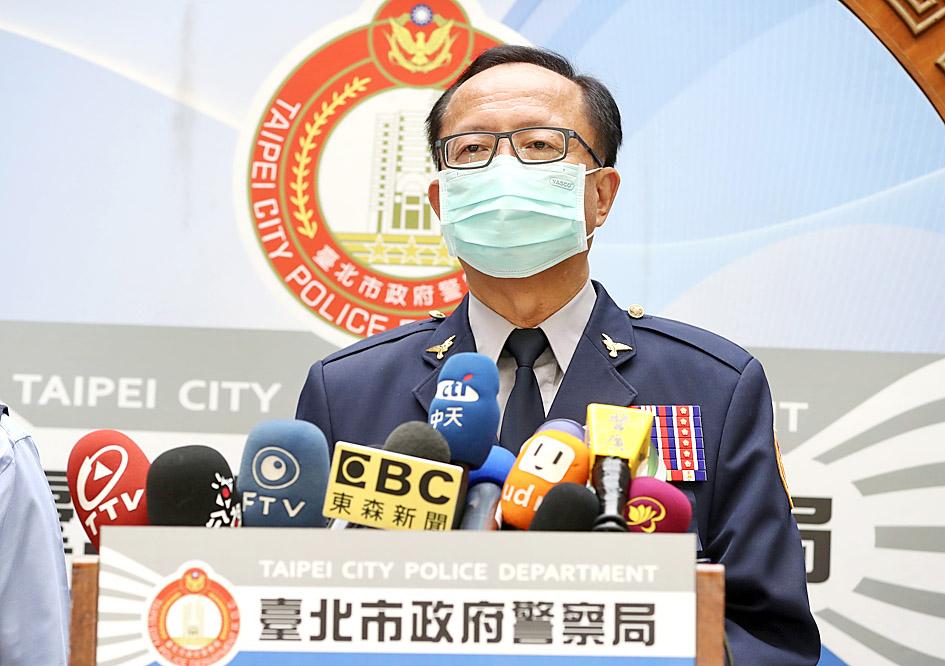Taipei Police Commissioner Chen Jia-chang (陳嘉昌) yesterday sought to reassure the public of the city police’s commitment to enhancing public security, announcing the results of recent crime sweeps and the arrest of major gang figures, as well as displaying a trove of confiscated weapons.
The department has been embroiled in controversy after a group of young men last month rampaged through Songshan Precinct’s Zhonglun Police Station, and the police allegedly tried to cover up the incident.
Chen told a news conference that his forces are resolved to clamp down on criminal groups and to curb street violence.

Photo: CNA
Police have conducted raids on suspected loan sharks and people who use violent tactics to collect debt, with many of them suspected to be linked to local chapters of the organized crime groups the Bamboo Union and Heavenly Way Alliance, which are active in Taipei, New Taipei City and Taoyuan, Chen said.
Acknowledging a slew of negative news that has eroded public confidence in the ability of law enforcement authorities to contain criminal activities, Chen said that police forces under his control would intensify their efforts to fight crime and conduct more crime sweeps to enhance public safety.
In a public demonstration of unity, Chen was accompanied at the news conference by the heads of the city’s 14 main precincts and Taipei Criminal Investigation Division officers.
A local boss, allegedly linked to the Bamboo Union, and eight gang members — including four teens — were arrested during a raid on Wednesday and taken in for questioning, Chen said.
They are facing potential charges of assault, extortion, forcible confinement, and contravening the Organized Crime Prevention Act(組織犯罪防制條例), he added.
Items seized in the raids were put on display, mainly weapons used by suspects in debt collecting and extortion, including knives, crowbars, baseball bats, hammers, chisels and metal files, along with confiscated cash, mobile phones, and sets for playing betting games.
Taipei police officials also released a list of figures showing that last year, 259 suspected gang members were arrested, including 38 major gang figures, while this year so far, 161 suspected gang members had been arrested, including 25 major criminal figures.
Separately, New Taipei City Mayor Hou You-yi (侯友宜) also led police in checking on businesses in some districts to ensure public safety, following a National Police Agency mandate for police chiefs nationwide to conduct crime sweeps.
Hou, with New Taipei City Police Commissioner Huang Tsung-jen (黃宗仁) and his forces, conducted raids in Sanchong District (三重) and other areas on Wednesday night, visiting nightclubs, KTV parlors and other entertainment premises, to check on possible illegal business operations, and to ensure that people are following regulations on wearing masks, real-name registration and other COVID-19 preventive measures.
Hou said an order came from National Police Agency Director-General Chen Ja-chin (陳家欽) for police chiefs in all cities and counties to conduct inspections and crime sweeps to deter street violence and other illegal activities to enhance public security.

Taiwan yesterday condemned the recent increase in Chinese coast guard-escorted fishing vessels operating illegally in waters around the Pratas Islands (Dongsha Islands, 東沙群島) in the South China Sea. Unusually large groupings of Chinese fishing vessels began to appear around the islands on Feb. 15, when at least six motherships and 29 smaller boats were sighted, the Coast Guard Administration (CGA) said in a news release. While CGA vessels were dispatched to expel the Chinese boats, Chinese coast guard ships trespassed into Taiwan’s restricted waters and unsuccessfully attempted to interfere, the CGA said. Due to the provocation, the CGA initiated an operation to increase

CHANGING LANDSCAPE: Many of the part-time programs for educators were no longer needed, as many teachers obtain a graduate degree before joining the workforce, experts said Taiwanese universities this year canceled 86 programs, Ministry of Education data showed, with educators attributing the closures to the nation’s low birthrate as well as shifting trends. Fifty-three of the shuttered programs were part-time postgraduate degree programs, about 62 percent of the total, the most in the past five years, the data showed. National Taiwan Normal University (NTNU) discontinued the most part-time master’s programs, at 16: chemistry, life science, earth science, physics, fine arts, music, special education, health promotion and health education, educational psychology and counseling, education, design, Chinese as a second language, library and information sciences, mechatronics engineering, history, physical education

The Chinese military has boosted its capability to fight at a high tempo using the element of surprise and new technology, the Ministry of National Defense said in the Quadrennial Defense Review (QDR) published on Monday last week. The ministry highlighted Chinese People’s Liberation Army (PLA) developments showing significant changes in Beijing’s strategy for war on Taiwan. The PLA has made significant headway in building capabilities for all-weather, multi-domain intelligence, surveillance, operational control and a joint air-sea blockade against Taiwan’s lines of communication, it said. The PLA has also improved its capabilities in direct amphibious assault operations aimed at seizing strategically important beaches,

‘MALIGN PURPOSE’: Governments around the world conduct espionage operations, but China’s is different, as its ultimate goal is annexation, a think tank head said Taiwan is facing a growing existential threat from its own people spying for China, experts said, as the government seeks to toughen measures to stop Beijing’s infiltration efforts and deter Taiwanese turncoats. While Beijing and Taipei have been spying on each other for years, experts said that espionage posed a bigger threat to Taiwan due to the risk of a Chinese attack. Taiwan’s intelligence agency said China used “diverse channels and tactics” to infiltrate the nation’s military, government agencies and pro-China organizations. The main targets were retired and active members of the military, persuaded by money, blackmail or pro-China ideology to steal